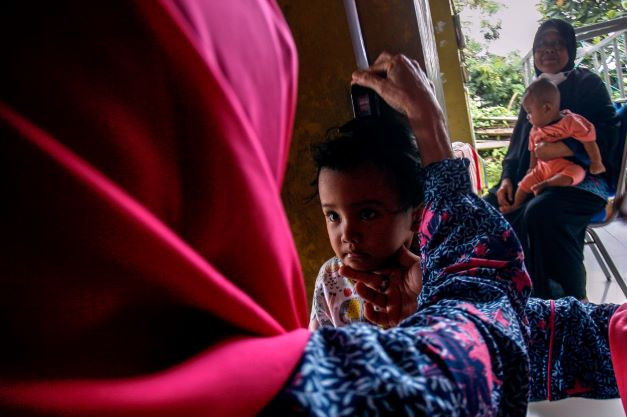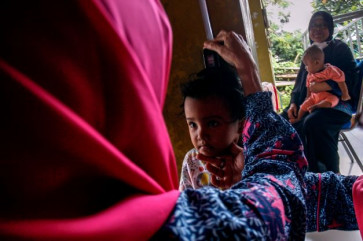Popular Reads
Top Results
Can't find what you're looking for?
View all search resultsPopular Reads
Top Results
Can't find what you're looking for?
View all search resultsNutrition, stunting and gender equality: Intimate trajectories
Gender disparities in nutrition for women and girls of reproductive age are still a serious problem in Indonesia.
Change text size
Gift Premium Articles
to Anyone
 Baby care: Family welfare movement volunteers measure the height of a girl below five years old in an integrated health post in the Bougenvile area of Depok, West Java on Sept. 7. The government has set a target of reducing the rate of child stunting from the current 27.4 to 14 percent by 2024. (Antara/Yulius Satria Wijaya)
Baby care: Family welfare movement volunteers measure the height of a girl below five years old in an integrated health post in the Bougenvile area of Depok, West Java on Sept. 7. The government has set a target of reducing the rate of child stunting from the current 27.4 to 14 percent by 2024. (Antara/Yulius Satria Wijaya)
F
or decades, our society has been practicing the food priority in the family’s dining as follows: first for fathers, second for sons, third for daughters and last for mothers. This family feeding system is considerably natural within the patriarchal culture that promotes men’s responsibility as the head of a family’s household.
The traditional gender role affirms men’s status; in this case, the father deserves the best food in the family no matter the mother’s condition, such as pregnancy. Hence, it results in differential nutritional outcomes due to the different quality of food men and boys receive compared with women and girls.
Gender disparities in nutrition for women and girls of reproductive age are still a serious problem in Indonesia. This discriminatory gender norm determines the feeding and caring system within the household. The Basic Health Research (Riskesdas) 2018 conducted by the Health Ministry showed the estimated number of pregnant women with anemia stood at around 48.9 percent, meanwhile, those with chronic energy deficiency was 17.3 percent.
In addition, maternal undernutrition leads to low birth weight, which causes childhood stunting. Adolescent girls within the age range of 15-24 years often suffer from anemia, and it causes iron deficiency that leads to weakness and fatigue. It reduces their physical ability to study and work.
For many poor families, boys tend to get priority for schooling compared with girls due to the assumption they would become the family’s future breadwinners. This situation is exacerbated by the low status of health and education of women and girls, which generally hampers their capacities to access food and their family’s other assets.
Meanwhile, the case of food insecurity and economic difficulties can cause tensions in the household, leading to intimate partner violence (gender-based violence) or even child marriage for girls. At the community level, we invariably discover the practice of child marriage as a solution to a family’s economic hardship. Obviously, early marriage can increase the risk of babies with a low birth weight, which lengthens the cycle of undernourishment or mortality in childbirth.
The National Socioeconomic Survey (Susenas) in 2017 identified married women aged below 18 would be less likely to be assisted by a skilled health professional during the childbirth process compared with the process of those married after 18 years old (84.5 percent and 92.2 percent, respectively).


















